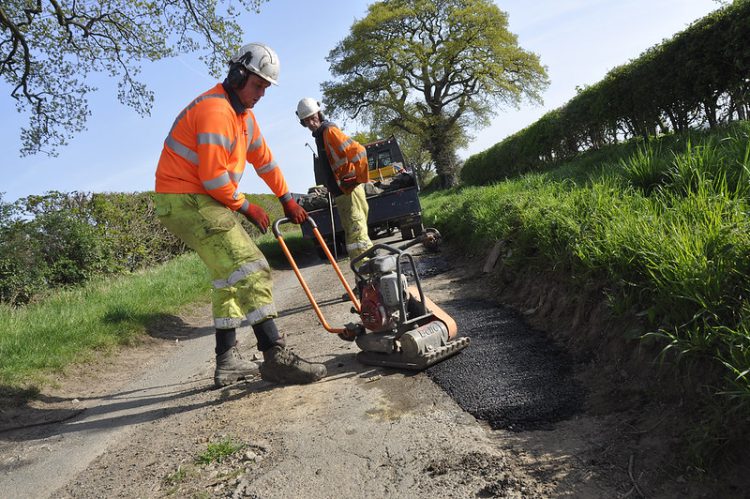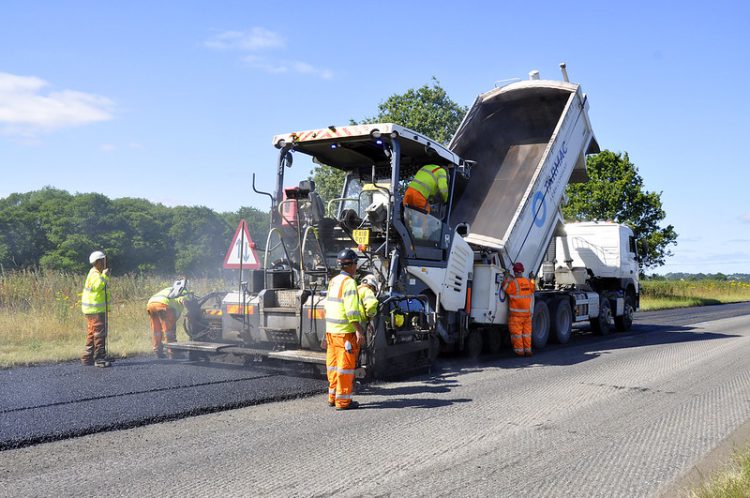Shropshire Council shortlisted for national award for road maintenance work

Find and fix pothole repairs being carried out near Adcote
Shropshire Council has been shortlisted for a national award for the impact of its new approach to maintaining and improving the county’s roads.
The council is one of the finalists for the ‘Innovation’ award at the LGC (Local Government Chronicle) Awards 2024, with the winner set to be announced in June.
By 2020 the council’s previous approach to highways maintenance had resulted in a backlog of 19,000 potholes and other defects on the council’s roads.
As a result, a new ‘mixed economy’ model of highway maintenance was introduced, which saw the council review its existing highways maintenance contract with Kier, launch new in-house operations and energise the local supply chain.
Shropshire Council was also the first council in the country to support and use a new procurement system designed to encourage innovation in highway maintenance, enabling it to speed up repairs while reducing procurement costs and ensure compliance.
The new approach has resulted in:
- 75% reduction in the cost of repairs between 2019 and 2023 – saving £1.4m per year. Whereas 90% of repairs were temporary in 2019, 90% are permanent in 2023.
- A reduction in the backlog of pothole repairs from 8,576 in 2020 down to 2,122 in 2022.
- A fall in drainage complaints from 1,000 in 2020 down to below 150 in 2023.
Residents have recognised the difference the new model has made – year on year, public satisfaction in highways is up 25%, according to the National Highway and Transport Public Satisfaction Survey.

Resurfacing work on the A41 in 2022
Dan Morris, Shropshire Council’s Cabinet member for highways, said:
“Shropshire is a large, rural county with 3,206 miles of roads – long enough to stretch from London to New York – and well-maintained highways are critical to so many aspects of life.
“In 2020 Shropshire’s road network, crucial for county prosperity, faced a crisis: mounting pothole backlogs, poor repairs and severe budget strains. Our sole provider contract model became both unfulfilling and unsustainable.
“A strategic overhaul was essential. We pioneered a ‘mixed economy model’ and formed ‘find and fix’ in-house teams for local, reactive services, complemented by an in-house drainage team and contracts with local providers. We realigned our core contractor to leverage their strengths.
“The result is a responsive, sustainable repair strategy, substantial savings, enhanced investment in Shropshire’s highways and a ground-breaking model for local government.”
Andy Wilde, Shropshire Council’s assistant director for infrastructure, said:
“Our model not only yields savings and enhances responsiveness, it has also bolstered local SMEs and has the potential for greater community engagement by increasing grant money to enable town and parish councils to take on local highways maintenance activities. The savings generated have allowed more resources to be diverted to other tasks and greater levels of spend on preventive maintenance.
“Our approach has garnered growing nationwide interest from other highways authorities at an opportune time with many coming to the end of existing contracts. We believe our model can and will be replicated by other councils, delivering huge benefits across the country.”
Further information
Andy Wilde has spoken about the council’s new model at national events including the Local Councils Road Innovation Group Strictly Highways Conference, and participated in an innovation panel debate at Highways UK.
The Innovation Procurement System – set up by the Local Councils Roads Innovation Group, in partnership with Crown Commercial Services and supported by the Department for Transport – is an important part of the council’s ‘mixed economy’ model.

